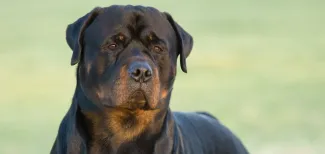DOWNLOAD PDF
An emergency care veterinarian, Wendy Haumaier, DVM, specializes in helping foster and care for rescued Rottweilers that have medical issues.
When she got “Rosie,” an 8-month-old puppy taken in by the Rottweiler rescue organization Kodi’s Club Rescue of New York in November 2018, she began dealing with clinical signs that stumped her.
“Rosie had a wobbly, stilted walk and would fall if she moved too fast,” says Dr. Haumaier of Pleasant Valley, New York. “She also had signs of micropthalmia, meaning her eye globes were unusually small. She was a happy, spirited puppy and very pretty.”
Four days after getting Rosie, Dr. Haumaier took her to a veterinary neurologist, who suspected the condition was genetic. Dr. Haumaier ordered a test kit for juvenile-onset laryngeal paralysis and polyneuropathy (JLPP) from the website of the Orthopedic Foundation for Animals. Rosie’s DNA was sent to the University of Missouri Small Animal Molecular Genetics Lab, which confirmed a diagnosis of JLPP.
After only two months, Rosie's condition began declining rapidly. "She was now experiencing regurgitation episodes from one to six times a day and could not swallow properly. After one of these episodes, I took her to a veterinary hospital, and then she was transferred to a specialty veterinary clinic. She had declined to a point she could not be saved."
A Disease of Puppies
A disease that occurs in young Rottweilers, JLPP affects neurological signaling that travels from the brain through nerves. In puppies born with JLPP, the vagus nerve, the longest and most complex cranial nerve, fails to develop normally. In a normal dog, the vagus nerve signals the muscles of the voice box, creating the sound of a bark when the vocal folds vibrate as air moves over them and assisting breathing by pulling the vocal folds aside so air can move easily into the lungs. The vagus nerve also helps to close the larynx when the dog swallows to prevent choking on food or water.
When the nerves are unable to convey messages properly, the muscles become weak or paralyzed. The vagus nerve is often affected first, explaining why laryngeal paralysis is generally the first sign of JLPP. The vocal folds cannot be pulled out of the way as the dog breathes. Instead, they vibrate noisily and can obstruct the flow of air into the lungs. When a dog regurgitates food or water, this can result in aspiration pneumonia.
The second longest nerve in the body, the sciatic nerve, is typically affected next. This accounts for why dogs have difficulty getting up and wobble as they walk. Usually the rear legs are affected first, followed by the front legs.
Treatment for JLPP is limited. The breathing problems caused by laryngeal paralysis can be improved with surgery, but the progressive disease eventually wins over. Weakness and coordination problems become more severe, and dogs can develop problems swallowing. While a rare condition, eventually all dogs have to be euthanized.
Reflecting on JLPP, Dr. Haumaier says, I am thankful there is so much attention to this little-known disease. It's good that the genetics are known, so hopefully breeders will make testing part of their program. Rosie was an inspiration I hope her story can help to save others."

